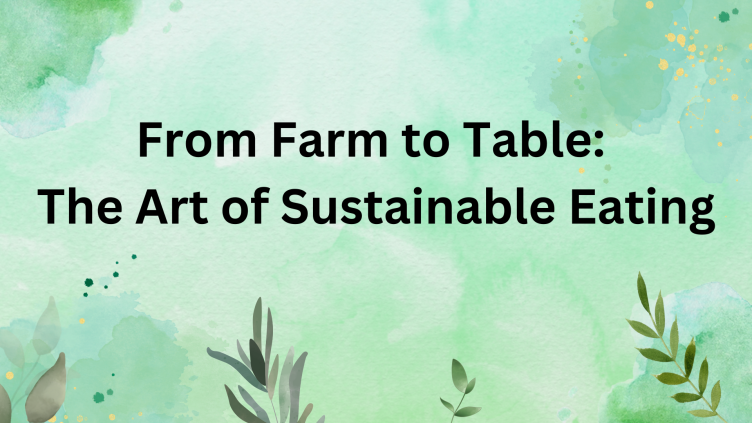In today’s world, where environmental sustainability and health-conscious choices are increasingly prioritized, the concept of “farm to table” has gained significant popularity. This movement not only emphasizes fresh, locally sourced foods but also promotes ethical farming practices and reduces the carbon footprint associated with food production and distribution.
Understanding Farm to Table
Farm to table, often referred to as farm to fork, is a culinary and agricultural movement that focuses on producing food locally and delivering it directly to consumers. The idea is to minimize the distance food travels from where it is grown or raised to where it is ultimately consumed. This approach supports local farmers, reduces transportation emissions, and ensures fresher, more nutritious food for consumers.
The Benefits of Sustainable Eating
- Environmental Benefits: By choosing locally grown produce and sustainably raised meats, consumers contribute to lower greenhouse gas emissions and reduced energy consumption associated with transportation and industrial farming practices.
- Health Benefits: Freshly harvested fruits and vegetables retain more nutrients compared to produce that has traveled long distances and spent time in storage. Sustainable farming practices also tend to use fewer pesticides and antibiotics, promoting healthier food choices.
- Supporting Local Economies: When consumers buy from local farmers and food producers, they contribute to the local economy, helping to sustain agricultural communities and small businesses.
- Promoting Biodiversity: Sustainable farming methods prioritize biodiversity and natural ecosystem management, which is crucial for preserving soil health, pollinator populations, and overall ecological balance.
Principles of Sustainable Eating
Sustainable eating goes beyond just buying local. It involves mindful choices that support ethical and environmentally friendly food production. Here are some key principles:
- Local and Seasonal: Choose foods that are in season and grown locally to minimize the environmental impact of transportation and storage.
- Organic and Non-GMO: Opt for organic products that are free from synthetic pesticides and genetically modified organisms (GMOs), promoting healthier ecosystems and reducing exposure to harmful chemicals.
- Animal Welfare: Support farms that prioritize humane treatment of animals, providing them with ample space to roam and access to natural diets.
- Reduced Food Waste: Practice mindful consumption to reduce food waste, which is a significant contributor to environmental degradation and greenhouse gas emissions.
How to Embrace Farm to Table in Your Daily Life
- Shop at Farmers’ Markets: Farmers’ markets offer a direct connection to local growers and artisans, allowing you to purchase fresh, seasonal produce, meats, dairy, and artisanal products.
- Join Community Supported Agriculture (CSA): CSA programs allow consumers to subscribe to receive seasonal produce directly from local farms, fostering a direct relationship between farmers and consumers.
- Grow Your Own Food: Even if you have limited space, growing herbs, vegetables, or fruits in containers or small gardens can promote sustainable eating and reconnect you with the food you consume.
- Support Sustainable Restaurants: Choose restaurants that prioritize locally sourced ingredients and sustainable practices in their menu offerings.
The Future of Sustainable Eating
As awareness of environmental issues grows, so does the demand for sustainable food options. Consumers are increasingly seeking transparency in food production practices and are willing to support businesses that prioritize sustainability. The farm-to-table movement continues to evolve, with innovations in urban agriculture, vertical farming, and community food initiatives contributing to a more resilient and sustainable food system.
Conclusion
Embracing the principles of farm to table not only supports healthier eating habits and environmental sustainability but also fosters a stronger connection between consumers and their food sources. By making informed choices and supporting local farmers and sustainable practices, individuals can play a significant role in shaping a more sustainable future.
For more insightful articles on food, sustainability, and lifestyle, visit Riya’s Blogs. Join us in exploring the art of sustainable eating and making a positive impact on our world.







